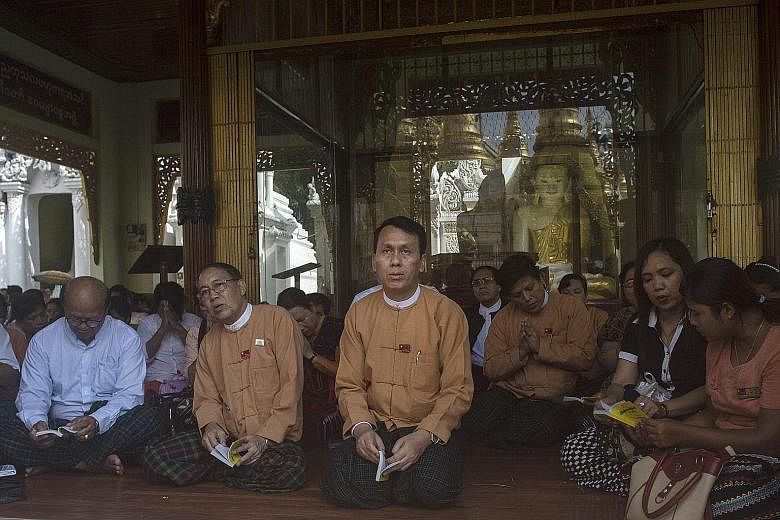YANGON • Ms Aung San Suu Kyi's first major infrastructure project could hardly be more visible - hundreds of new yellow buses now plying the streets of Yangon in what her ruling party hopes will be a potent symbol of how it is transforming peoples' lives.
But two deals to import 2,000 buses from China estimated at over US$100 million (S$136 million) have caused an unusual rift within her National League for Democracy (NLD), with regional lawmakers questioning the cost and accusing Yangon Chief Minister Phyo Min Thein, a Suu Kyi protege, of cronyism and a lack of accountability.
"Phyo Min Thein's government lacks transparency," said Yangon NLD lawmaker Kyaw Zay Ya. "The image of the government will be damaged if he doesn't change."
The deals, struck with Chinese firms and a businessman with ties to the junta that ruled Myanmar for decades, have also soured relations with the West, say diplomats.
While there is no evidence that any laws were broken in the awarding of the contracts, Mr Roland Kobia, the European Union ambassador to Myanmar, complained in a private letter to Commerce Minister Than Myint of a lack of transparency in public procurements.
"Currently, the domestic economy remains dominated by a small number of domestic and regional actors whose longstanding practices prevent fair competition," Mr Kobia wrote in the letter seen by Reuters. The letter dated June did not specifically refer to the bus deals.
Although the Chinese buses were about half the price of international rival brands, engineers who inspected them for Myanmar predict that they will wear out and need to be replaced far sooner than the international standard. Mr Phyo Min Thein and other ministers have defended the deals, saying the government-to-government agreement with China offered a discount and express delivery.
Mr Kobia said in a statement in response to Reuters' questions that "many European actors stand ready to work in Myanmar, but more needs to be done to give them a fair chance to compete for contracts". He was referring to the broader issue of transparency in public procurements, the EU said.
When Ms Suu Kyi swept to power in an electoral landslide in 2015, analysts predicted Western firms would flock to the country. But the Yangon bus deals underscore that her backers in the West have grown disillusioned as Myanmar increasingly prefers to do business with China.
Yangon officials last year rejected a proposal to improve the transit network from the World Bank's investment arm, the International Finance Corporation, due to differences over the details of the plan, which required detailed traffic monitoring and an open tender process.
Initial talks with potential French and Dutch suppliers also came to nothing, because they could not deliver the number of buses with the speed the chief minister was demanding, diplomats and lobbyists involved said.
Instead Yangon Bus Public Company (YBPC), a public-private joint venture majority-owned by the city government, bought 1,000 buses from two Chinese suppliers picked by Beijing's ambassador to Myanmar, Mr Hong Liang.
Another 1,000 buses were bought from a third Chinese company in a private deal by businessman Kyaw Ne Win, a grandson of former junta leader Ne Win.
There was no public tender or debate in the regional legislature before the deals were agreed on.
"Yes, people can say that there's no transparency," said YBPC chairman Maung Aung. "But calling a tender is not necessarily better. The deal was struck to maintain good relations between the two countries."
REUTERS

